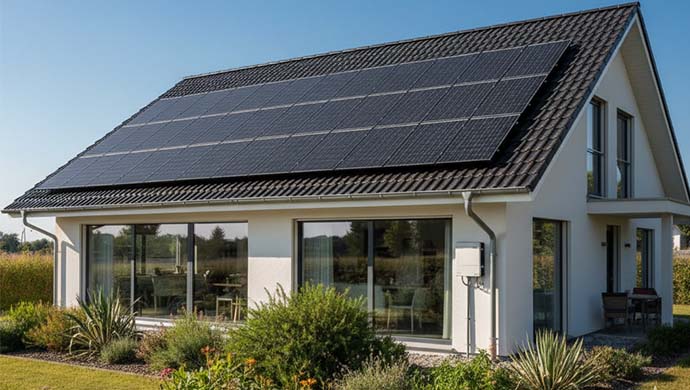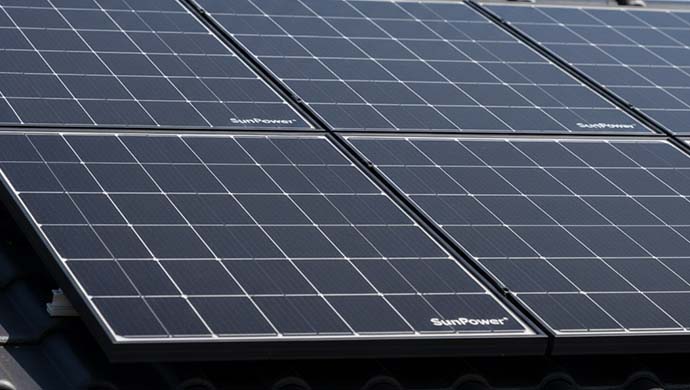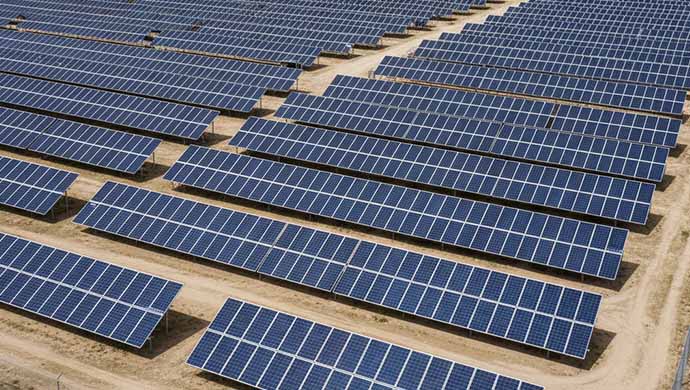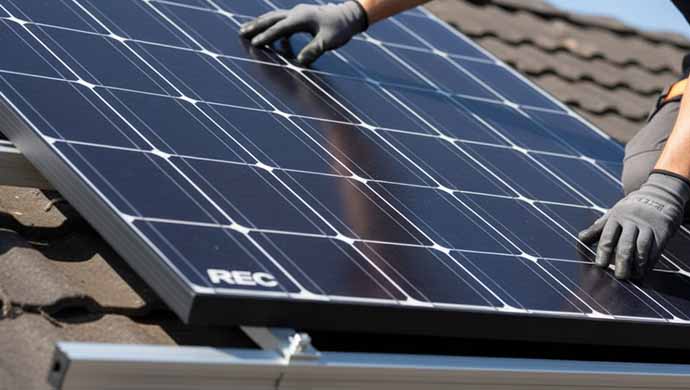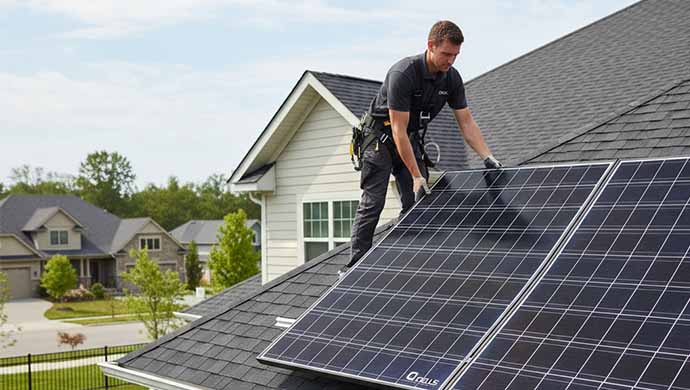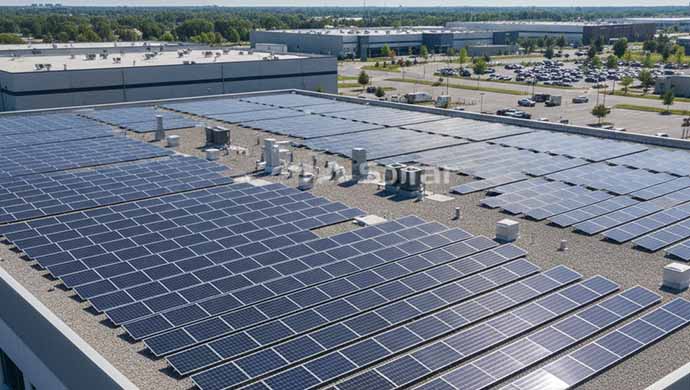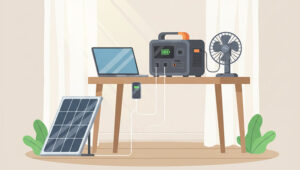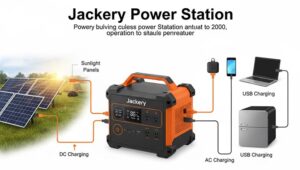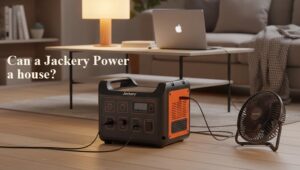“Best” depends on your goal — highest efficiency, lowest cost, easiest installation, best warranty, or best long-term reliability. Regional availability and installer relationships also matter.
1) SunPower — Premium / highest-efficiency option
Why it’s good: SunPower (Maxeon) consistently produces some of the market’s highest-efficiency residential panels and offers very strong, long-term warranties and system-level guarantees. Customers praise the high energy yield per m² and the company’s integrated warranty packages.
Strengths: top efficiency (great for small roofs), long performance warranties, strong product engineering.
Weaknesses: premium price; recent corporate/financial turbulence has raised questions about long-term business support in some markets (check local warranty service).
Best for: homeowners who want maximum energy from limited roof space and are willing to pay extra for efficiency and warranty coverage.
2) Trina Solar — High-tech + value leader
Why it’s good: Trina balances strong R&D with competitive pricing. It leads in large-scale & commercial deployments and has been at the forefront of high-efficiency cell records (HJT / n-type achievements). Reviewers note reliable performance for residential and utility use.
Strengths: good price-to-performance, broad product lineup (including bifacial and high-efficiency modules), strong global supply.
Weaknesses: model lineup is large — pick the exact model carefully; some top-tech lines are optimized for utility projects rather than small roofs.
Best for: customers who want modern tech at a reasonable price — especially larger systems or mixed commercial/residential projects.
3) JinkoSolar — Mass-market, affordable & widely available
Why it’s good: Jinko is one of the world’s largest panel manufacturers and offers very competitive cost-per-watt options and broad availability. Their mainstream lines (Tiger series, etc.) provide good efficiency at scale.
Strengths: affordability, wide global distribution, many installers stock it (easy to source & replace).
Weaknesses: warranty terms and some mid-tier models vary — check exact model warranty; some reviews call out shorter product warranties on selected SKUs.
Best for: buyers who prioritize cost-effectiveness and easy availability (good for budget-conscious residential and utility-scale buyers).
4) REC — Quality-focused, reliable performer
Why it’s good: REC is widely praised in expert reviews for consistent build quality, good warranties and reliable long-term performance. It’s often recommended when you want a quality/price balance with solid customer satisfaction.
Strengths: high-quality manufacturing, competitive warranties, stable field performance.
Weaknesses: prices are usually higher than commodity-tier Chinese modules; availability can be regional.
Best for: homeowners and businesses who want a trustworthy mid-to-high tier brand with good warranty support.
5) Hanwha Q CELLS — Balanced, installer-friendly choice
Why it’s good: Q CELLS regularly ranks highly in brand surveys and review roundups for performance, warranty offerings and installer support. Customers report steady output and strong warranty coverage on many series.
Strengths: very good warranty offerings on premium lines, solid efficiency, easy installer network and service.
Weaknesses: depending on model, some panels are middle-of-the-road on price/efficiency (not the absolute top performer).
Best for: buyers who want a well-rounded panel with good warranties and widespread installer familiarity.
Least-popular / lower-consumer-recognition pick (listed last as requested)
JA Solar — strong manufacturer but lower consumer-brand recognition in some markets
Why it’s listed last: JA Solar is a huge and technically capable manufacturer (awarded many “Top Brand PV” titles globally) and makes quality modules — but in many homeowner markets its brand recognition and direct consumer support are lower than the five brands above. That can mean installers may favor other brands for residential installs, or warranty/help channels vary regionally.
Strengths: reliable manufacturing, strong global market share, good value.
Weaknesses: slightly less consumer-facing brand recognition and variable local service availability (so double-check installer warranty handling).
Best for: projects where module cost and performance matter more than a well-known consumer brand name — often used in utility/commercial projects.
Quick buying checklist (based on brand choice & customer feedback)
- Verify the exact model (not just brand) — efficiency, temp coefficient, degradation and warranty specifics differ across models.
- Check local warranty service and who handles claims (manufacturer vs installer).
- Read recent customer reviews for your country/region (installer responsiveness matters).
- Match the brand/model to your use case (small roof → high-efficiency; large ground array → cost-per-watt matters).
- Ask your installer for real-world production data from nearby installations of the same model.
Frequently Asked Questions (FAQs)
Q1: Which solar panel brand has the highest efficiency?
A: SunPower (Maxeon) panels are known for the highest residential efficiency, often above 22%.Q2: Which brand offers the best balance of price and performance?
A: Trina Solar and JinkoSolar are often considered the best value-for-money options.Q3: Are all solar panel brands suitable for homes?
A: Yes, but some like SunPower, Q CELLS, and REC are more popular for residential rooftops, while Trina and Jinko are often used for larger or utility-scale projects.Q4: How important is warranty when choosing a solar panel brand?
A: Very important — brands like SunPower, Q CELLS, and REC are praised for strong long-term warranties, ensuring system reliability.Q5: Which solar panel brand is less recognized among homeowners?
A: JA Solar makes reliable panels but has lower consumer recognition compared to SunPower, Trina, or Q CELLS.

